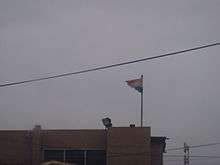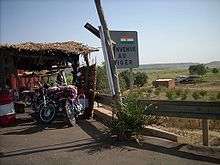Foreign relations of Niger
Niger pursues a moderate foreign policy and maintains friendly relations with both East and West. It is a member state of the United Nations. Niger maintains a special relationship with France and enjoys close relations with its West African neighbours.
 |
|---|
| This article is part of a series on the politics and government of Niger |
|
| Judiciary |
|
Multilateral relations
It is a charter member of the Organization of African Unity and the West African Monetary Union and also belongs to the Niger Basin Authority and the Lake Chad Basin Commission, the Economic Community of West African States, the Non-Aligned Movement, and the Organisation of Islamic Cooperation. Niger belongs to the United Nations and its main specialized agencies and in 1980-81 served on the UN Security Council. The first president of Niger, Hamani Diori, maintained close relations with the west and became internationally prominent in his diplomatic work, seeking to broker resolutions to conflicts in Africa and beyond. He was particularly prominent in his involvement as a negotiator during the Nigerian Civil War.[1]
Niger maintains a permanent purpose to the United Nations Headquarters in New York City, at 417 East 50th Street. In 2009, its Ambassador to the United Nations was Ibrahim A. Abani.[2]
Bilateral relations
| Country | Formal Relations Began | Notes |
|---|---|---|
| ||
|
Despite the occasional recurrence of a border conflict over Lete Island in the Niger River, Benin and Niger, both former French subjects of French West Africa, relations are close. Niger relies on the port at Cotonou, and to a lesser degree Lomé (Togo), and Port Harcourt (Nigeria), as its main route to overseas trade. Niger operates a Nigerien Ports Authority station, as well as customs and tax offices in a section of Cotonou's port, so that imports and exports can be directly transported between Gaya and the port. French Uranium mines in Arlit, which produce Niger's largest exports by value, travel through this port to France or the world market. | ||
| 1962 | ||
| 20 July 1974 | See China-Niger relations
China established diplomatic relations with Niger on July 20, 1974. On June 19, 1992, the transitional government of Niger declared the reestablishment of the "diplomatic relations" with Taiwan. The Chinese Government thus announced its suspension of diplomatic relations with Niger on July 30 of the same year. On August 19, 1996, China and Niger re-established diplomatic relations.[5] | |
| See France-Niger relations
Niger has maintained close ties with France, its former colonial power. Following Niger's independence in 1960, France maintained several hundred advisers at all levels of Niger's government and military. In the 1960s, the Military of Niger was drawn entirely from Nigerien former members of the French Colonial Forces: officered by Frenchmen who agreed to take joint French-Nigerien citizenship. In 1960 there were only ten African officers in the Nigerien army, all of low rank. President Diori signed legislation to end the employment of expatriate military officers in 1965, some continued to serve until the 1974 coup, when all French military presence was evacuated.[6] As well, the French had maintained until 1974 around 1,000 troops of the 4th Régiment Interarmes d'Outre-Mer [7] (Troupes de Marine) with bases at Niamey, Zinder, Bilma and Agadez. In 1979 a smaller French force was again based permanently in Niger.[8] Franco-Nigerien relations continue to be close, with France as Niger's top export partner (in value), and the French government being almost entirely dependent upon Niger for the Uranium which fuels its extensive Nuclear Power system, mined in the northern town of Arlit.[9] | ||
| 25 June 1979 |
Both countries established diplomatic relations on June 25, 1979.[10] | |
| See India–Niger relations | ||
|
In December 2017, Prime Minister Paolo Gentiloni announced that 470 Italian soldiers would be deployed to Niger in an effort to mitigate the European migrant crisis.[14] | ||
| 27 July 1961 |
Establishment of diplomatic relations between the Republic of Korea and Niger began on July 27, 1961.[15] | |
| 15 August 2011 |
Niger officially recognised the Republic of Kosovo on 15 August 2011.[16] Kosovo and Niger established diplomatic relations on 25 January 2013.[17] | |
|
Niger has close relations with its neighbour Mali, with large scale trade links and sizable population movement between the two nations. Both were subject states in French West Africa. Niger and Mali have fought related Tuareg insurgencies in their respective northern territories in the 1990s and mid-2000s. | ||
| 6 November 1975 | ||
| See Niger–Nigeria relations
Nigeria maintains close relations with the Republic of Niger, in part because both nations share a large Hausa minority on each side of their 450-mile (1500 km) border. Hausa language and cultural ties are strong, but there is little interest in a pan-Hausa state.[19] The two nations formed the Nigeria-Niger Joint Commission for Cooperation (NNJC), established in March, 1971 with its Permanent Secretariat in Niamey, Niger.[20] | ||
|
Pakistan supports Niger's territorial and sovereign integrity and rejects Libya's advances as aggression. | ||
| See Niger–Spain relations | ||
| See Niger-United States relations
A conservative foreign policy has meant that under Niger's first president and—following military coup—the 1974–1991 military government, Niger maintained good relations with the United States, Israel, and NATO governments in general. During the Cold War, Niger maintained a non-confrontational attitude to the Soviet Union and its allies.[21] |
Other

Niger has only 24 permanent embassies abroad, although more have permanent representation in Niamey, either through national embassies or other representatives. The United Kingdom, for instance, operates its permanent office for relations to Niger from Accra, Ghana, while Niger's permanent representative resides at the Nigerien Embassy in Paris.
Many other small or distant nations have no formal diplomatic relations with Niamey except through their respective consulates at the United Nations Headquarters in New York City. Australia, for instance, only signed the instruments of formal diplomatic relations with Niamey on 7 May 2009, through their respective consular officials at the UN.[2]
Border disputes
Libya has in the past claimed a strip along their border of about 19,400 km² in northern Niger. There have been several decades of unresolved discussions regarding the delimitation of international boundaries in the vicinity of Lake Chad between Niger, Nigeria, Chad, and Cameroon. The lack of firm borders, as well as the receding of the lake in the 20th century led to border incidents between Cameroon and Chad in the past. An agreement has been completed and awaits ratification by Cameroon, Chad, Niger, and Nigeria.
Niger has an ongoing conflict with Benin over Lété Island, an island in the River Niger approx. 16 kilometres long and 4 kilometres wide, located around 40 kilometers from the town of Gao, Niger. Together with other smaller islands in the River Niger, it was the main object of a territorial dispute between Niger and Benin, which had begun when the two entities were still under French rule. The island, and seasonally flooded land around it is valuable to semi-nomadic Puel cattle herders as a dry season pasturage. The two countries had almost gone to war over their border in 1963 but finally chose to settle by peaceful means. In the early 90s a joint delimitation commission was tasked with solving the issue but could not reach an agreement. In 2001 the two parties chose to have the International Court of Justice (ICJ) decide on the matter once and for all. In 2005, the ICJ ruled in Niger's favour.[22]
Niger has ongoing processes delimiting sections of their borders with Burkina Faso and Mali, disputes which date back to the colonial period. These entities, along with Benin and other nations which do not border Niger, were semi independent elements of French West Africa. Within the colonial administration, borders were frequently changed, with Niger colony once possessing large portions of what is now Burkina Faso and Mali, as well as much of northern Chad, later associated with French Equatorial Africa. Disputes between these post-independence nations have been minor and peaceful.
References
- Samuel Decalo. Historical Dictionary of Niger (3rd ed.). Scarecrow Press, Boston & Folkestone, (1997) ISBN 0-8108-3136-8
- "Diplomatie/le Niger et la République d'Australie établissent des relations diplomatiques". Le Sahel. 12 May 2009
- Embassy of Canada in Mali
- Embassy of Niger in the United States
- http://www.china.org.cn/english/features/focac/183430.htm
- for the section History of the FAN prior to 1974, see Samuel Decalo. Historical Dictionary of Niger (2nd ed.). Scarecrow Press, London and New Jersey (1979). ISBN 0-8108-1229-0 pp.33?35.
- 4e Régiment Interarmes d'Outre-Mer: the 4th RIAOM was dissolved after leaving Niger.
- Samuel Decalo. Coups and Army Rule in Africa, Yale University Press (1990). ISBN 0-300-04045-8
- Decalo (1997).
- Indian High Commission in Niger
- Indian mission in Niger
- Niger High Commission in India
- Agence France-Presse (December 28, 2017). "Italy to send almost 500 troops to Niger to stem migrant flow: PM". The Local. Retrieved December 29, 2017.
- http://www.mofa.go.kr/ENG/countries/middleeast/countries/20070824/1_24469.jsp?menu=m_30_50
- The Republic of Niger and the Republic of Guinea Conakry recognize Kosovo’s independence, Ministry of Foreign Affairs of the Republic of Kosovo, 2011-08-16
- "Republika e Kosovës dhe Republika e Nigerit vendosin marrëdhëniet diplomatike" (in Albanian). Ambasada e Republikës së Kosovës në Paris. 2013-01-25. Retrieved 2013-02-04.
- Embassy of Mexico in Nigeria
- William F. S. Miles. "Development, not division: local versus external perceptions of the Niger-Nigeria boundary". The Journal of Modern African Studies (2005), 43:2:297-320
- INTEGRATED ECOSYSTEM MANAGEMENT IN SHARED CATCHMENTS BETWEEN NIGERIA AND NIGER EGEF Council Documents, MFA Regional Annex, 2006.
- Decalo (1997), Decalo (1990).
- Fabio Spadi (2005) The ICJ Judgment in the Benin-Niger Border Dispute: the interplay of titles and ‘effectivités’ under the uti possidetis juris principle, Leiden Journal of International Law 18: 777-794
- Stub created from US State Department Report, 2007.
